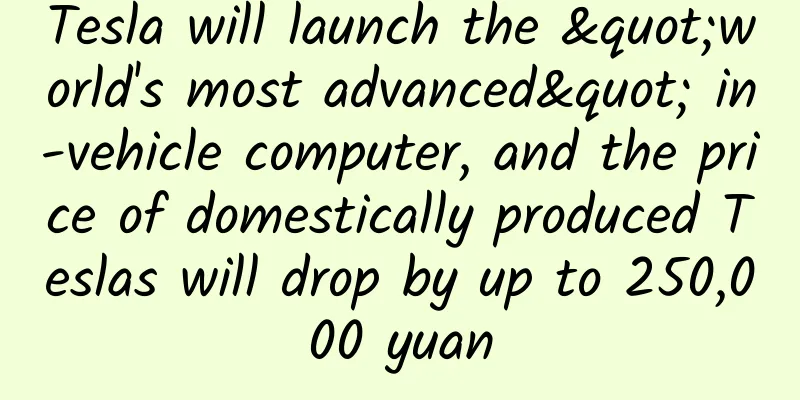Tesla will launch the "world's most advanced" in-vehicle computer, and the price of domestically produced Teslas will drop by up to 250,000 yuan

|
Tesla claims that it currently has the "world's most advanced" self-driving car computer, which it will apply to its vehicles next year. Pete Bannon of Tesla's technical team confirmed in a recent earnings call that the company has produced autonomous driving chips and is currently being configured in road test vehicles. Bannon said the chip will be included in the new hardware 3 suite of the Autopilot system, called Autopilot 3.0, which will replace the old onboard computer that powers the current Autopilot 2.0 and 2.5, which have been in production since October 2016. Musk said the in-vehicle computer developed by the company is orders of magnitude better than anything currently available. The Autopilot 2.0 hardware suite is powered by Nvidia GPUs and can process at 200 frames per second. Tesla's Autopilot 3.0 hardware, by comparison, processes at 2,000 frames per second and has redundancy. Bannon and Musk reiterated that the new computer will be used as an upgrade for the current Autopilot 2.0 (and higher) versions, and car owners only need to replace the onboard computer. Bannon said the hardware upgrade is expected to be scheduled for next year. Meanwhile, Tesla still plans to improve the Autopilot system on current hardware and launch version 9.0 software in the next "four weeks." Recently, Tesla announced its Shanghai factory plan. The Shanghai factory has an annual production capacity of 500,000 vehicles, and it is estimated that it may take five years to start full production. Currently, domestic consumers who purchase an imported Model S not only need to pay for transportation costs, loading and unloading costs, 40% tariffs and value-added tax, but also need to pay an additional purchase tax of about 10% after deducting the value-added tax, because Tesla uses a unique charging system and is not included in the "Catalogue of New Energy Vehicle Models Exempted from Vehicle Purchase Tax". The above costs mean that a Model S that sells for $80,000 in the United States will ultimately cost $140,000 in China. In the future, if domestic consumers directly purchase the Model S produced in the Shanghai factory, they will not only save $3,600 in shipping costs, but also 40% of the tariff (about $30,400). On this basis, the value-added tax required to pay for the whole vehicle will also be reduced accordingly. In this way, a "localized" Model S will save about $36,000, equivalent to RMB 250,000. As a winner of Toutiao's Qingyun Plan and Baijiahao's Bai+ Plan, the 2019 Baidu Digital Author of the Year, the Baijiahao's Most Popular Author in the Technology Field, the 2019 Sogou Technology and Culture Author, and the 2021 Baijiahao Quarterly Influential Creator, he has won many awards, including the 2013 Sohu Best Industry Media Person, the 2015 China New Media Entrepreneurship Competition Beijing Third Place, the 2015 Guangmang Experience Award, the 2015 China New Media Entrepreneurship Competition Finals Third Place, and the 2018 Baidu Dynamic Annual Powerful Celebrity. |
>>: Why does Musk want to take Tesla private? Three reasons why Musk wants to "sell" the company
Recommend
How to make users like your marketing ads?
Don’t try to bother users with things they don’t ...
Sony SP700N noise-cancelling sports beans review: No one around except the natural sound
Sony's efforts in noise-canceling earbuds are...
How can a product achieve explosive growth in users?
Competition among Internet products is essentiall...
Should nails be cut into round or square shapes? How short should they be cut? I didn’t expect there are so many things to know about nail cutting
Cut your nails Different people have different cu...
What is the significance of the two lotus seeds included in Nankai’s admission letter? Why give two lotus seeds?
What is the significance of the two lotus seeds i...
Is there a second solar system in the universe?
Why is the Kepler-90 star system called the secon...
iOS 16.4 push update, several new features!
Early this morning, Apple pushed the first Beta u...
Competitive product analysis report: Bilibili VS A-station & TikTok
This article is a competitive product analysis re...
Does Nintendo Switch, which is three years late to enter the Chinese market, still have a chance?
About three years ago, Microsoft's XBOX ONE e...
Super Flash Hao Keming: Mobile Flash web games are in a new blue ocean era
This is an era of universal entertainment. The ex...
Chinese astronauts set new record for extravehicular activities
On September 17, Cai Xuzhe and Chen Dong successf...
Are the popular plant-based foods just a waste of money or are they really good for your health?
Nowadays, more and more people are beginning to r...
The first person to eat spicy noodles has been found! But this "national snack" is really recommended to be eaten less
Audit expert: Zhou Jiaojiao Associate Professor, ...
Kaifeng, an underestimated ancient capital?
Kaifeng “Ancient Capital of Seven Dynasties” The ...
New changes in Internet subtitle groups may no longer be incompatible with copyright holders
If you are a fan of American dramas or Japanese a...









